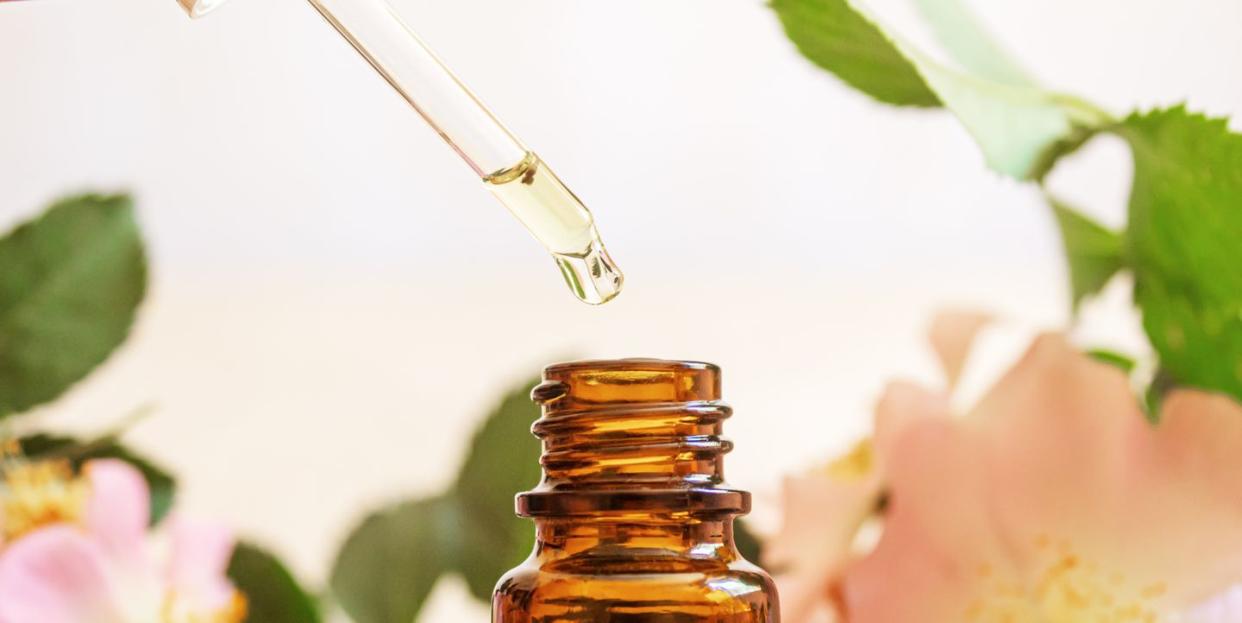8 Ways Rose Hip Oil Can Improve Your Complexion

"Hearst Magazines and Yahoo may earn commission or revenue on some items through the links below."
Ashwagandha root, sea kelp extract, tiger herb, tea tree oil. Sometimes beauty ingredients sound a little like something you'd find in a magical potion. And, in a sense, these plant-based ingredients are sort of magical—they can do wonders for your skin, including evening texture and tone, diminishing dark circles, and giving your face an overall glow.
The latest buzzy botanical beauty ingredient? Rose hip oil—an oil extracted from the seed of the rose bush. The oil has surged in popularity, thanks to praise from celebrities like Miranda Kerr and Kate Middleton. (According to US Weekly, Middleton uses Trilogy's formula daily.)
But what is rose hip oil?
"It's a versatile ingredient that can help optimize the look and feel of the skin and scalp," says Manish Shah, a board-certified dermatologist in Denver. "It can be applied to the face and neck, hands, heels, elbows, and knees, as well as your hair and scalp."
Okay, but what are the benefits?
"Rose hip oil has been shown to have anti-inflammatory and antioxidant benefits, which can be very useful tools in one’s anti-aging arsenal," says Nikhil Dhingra, MD, a board-certified dermatologist at Spring Street Dermatology in NYC.
To reap maximum benefits, apply the oil twice daily as part of your regular skincare routine, says Dhingra. With regular use, you may notice the following.
It moisturizes and plumps skin.
Because rose hip is rich in everything from antioxidants to vitamins to fatty acids, it nourishes your skin’s protective barrier helping prevent further moisture loss, says Shah. What's more, the fatty acids mirror the lipid content in the skin, which naturally help the skin better absorb the oil.
Rose hip oil may help relieve eczema.
"The patients most likely to benefit from rose hip oil are those with eczema and dryness-induced itching, as it can help restore a broken skin barrier and combat the inflammation of cracked skin," says Dhingra.
It can make your skin firmer.
Rose hip oil stimulates collagen production and neutralizes free radicals that can damage the skin, says Shah. "It also stimulates elastin production, which helps the skin seem firmer and replenishes its tightness."
Plus, improve tone.
The rich content of fatty acids, mixed with a potent dose of antioxidants in rose hip oil, help the skin tissue generate new cells, says Shah. This can give your skin a more even tone and texture overall.
It may reduce hyperpigmentation.
Both acne and aging can result in areas of hyperpigmentation on the skin. Because rose hip oil contains vitamin A—an ingredient proven to increase cell turnover—it can help address these sun and age spots, says Shah.
And diminish fine lines and wrinkles.
Its tissue and skin cell regeneration effect combined with its vitamins A, C, and E content help make rose hip oil a natural way to address crow’s-feet around the eyes and fine expression lines, says Shah.
Rose hip oil can reduces scars.
Rose hip oil also contains something called linolenic acid—a fatty acid that helps restore the skin and condition the outer layers, says Shah. As a result, over time, you may notice an improvement in the severity of surface scars.
And minimize stretch marks.
Because rose hip oil effectively regulates collagen production and prevents further breakdown of collagen, it can improve the appearance of stretch marks over time, says Dhingra.
Are there any side effects?
Though rose hip oil is relatively less comedogenic, or clogging, it can still flare oily, rosacea, or acne-prone skin, says Dhingra. This will vary from individual to individual, but if you notice an increase in breakouts after using rose hip oil, Dhingra suggests tabling the product and seeing a board-certified dermatologist.
And if you have sensitive skin or are using prescription treatment for a condition like psoriasis or eczema, consult your doctor when trying new ingredients like rosehip oil, says Shah.
For the average person, allergic reactions are rare, but it's a good idea to do a patch test on skin before using any product for the first time, says Shah. "If you generally have healthy skin, but experience itching, rashing, or redness, suspend use and consult your doctor."
You Might Also Like

